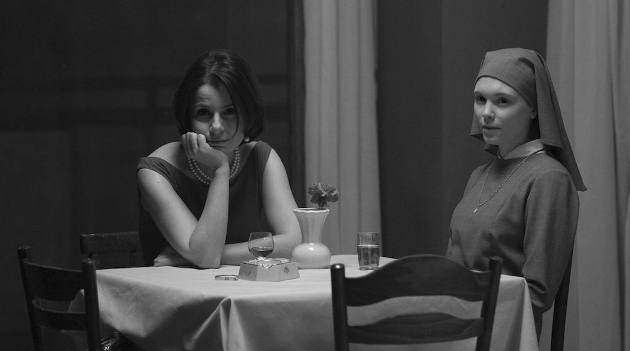
Written by Rebecca Lenkiewicz and Pawel Pawlikowski
Directed by Pawel Pawlikowski
Poland/Denmark, 2013
UK-based filmmaker Pawel Pawlikowski returns to the country of his birth with a film that explores the persistence of the war in 1960s Poland. Shot in Academy ratio and soft black and white, the cinematography by Ryszard Lenczewski and Lukasz Zal is beautiful, capturing the stark landscapes and emotional weight of the historical period. The setting and subject matter seem to give Pawlikowski renewed impetus at an important stage in his career and the result is a measured, sombre film that succeeds in evoking the intricate world of its central figures.
Ida tells the story of the title character (Agata Trzebuchowska), an orphaned nun who is preparing to take her vows. Before she is allowed to do so, she is told to leave the convent and visit her only living relative, her aunt Wanda (Agata Kulesza), who reveals that she was born a Jew and her parents were secretly murdered in the war. They set out on a journey to find out what really happened, as Wanda attempts to confront the demons of their shared past and show Ida the kind of life she should have been living. For very different reasons, both women urgently need to rediscover their identities and they provide each other with the catalyst to do so.
The most interesting aspect of the film is the contrast between these two perspectives and the effect it has on their reactions to what they unearth. Ida, having spent her entire life in a cloister, exists in a realm of innocence, stillness and peace, which allows her to forgive everything. It is a profound and commendable way of being but also works as a kind of avoidance. Wanda, who used to be a Communist prosecutor capable of sending men to their deaths, is still an active, political figure. Her career is ruined but she remains antagonistic and confrontational, seeking out those responsible for the crimes which continue to haunt her. However, this too is a limited perspective and leaves her fighting against enemies that scarcely any longer exist. You get the impression that she used to be an incredible, driven woman but drink and a lack of purpose have left her a shadow of her former self.

The differences between the two leads is also evident in the way they are shot. Ida is all angles and scarcely moves. Her stances are compositional and her reserved expressions emanate from her eyes. Wanda is depicted more spontaneously and with a degree of humour, the long takes breaking down into something more abrupt. Despite the sparse dialogue and deliberate pace, Trzebuchowska and Kulesza both give their characters a tremendous amount of warmth and inject plenty of life into the film. Their performances are beautifully understated, matching the artful, precise direction and delicate impact of the events that unfold.
As well as being a historical drama, Ida is a road movie and coming of age tale, showing how the young nun is transformed by her contact with a messy secular world. Wanda eagerly introduces her to the joys of sex, jazz and alcohol but Ida approaches these new experiences reluctantly, trying to work out how they fit into her altered conception of religious life. When a handsome saxophonist (Dawid Ogrodnik) plays a gig in their hotel, Ida is attracted to the beauty and energy of the music and gets her first taste of sexual desire. However, her pursuit of new adventures is always ambiguous, undermined by the nagging feeling that she has already made up her mind.
The narrowing and expansion of vision is an important motif throughout the film, emphasised with a series of masks and framing devices that further reduce the size of the already boxy screen. There is a wonderful scene towards the end, set in an arched room with a black and white checked floor; the arrangement of shapes and figures is exquisite, even though half the frame is shrouded in darkness. There are glimpses of Béla Tarr in the careful construction of many of the shots, as well as in the pace that provides the film with slow but inexorable momentum. Marking a return to form for Pawlikowski, Ida is is a film of elegance and genuine depth. It deals with complex issues, including race, religion, sexuality and loss, showing grace, consideration and restraint.
Visit the 2014 Glasgow Film Festival’s official website here.

